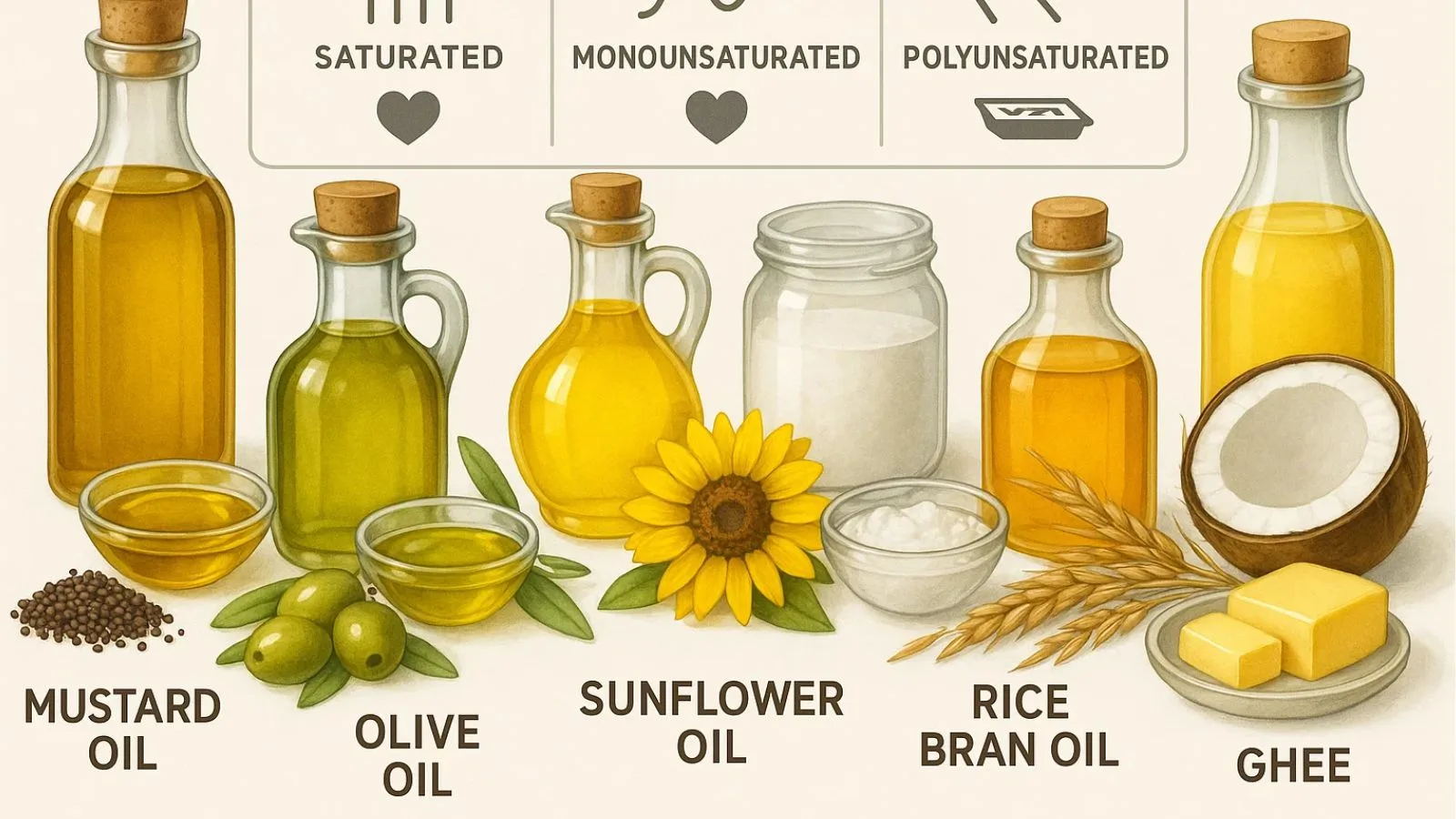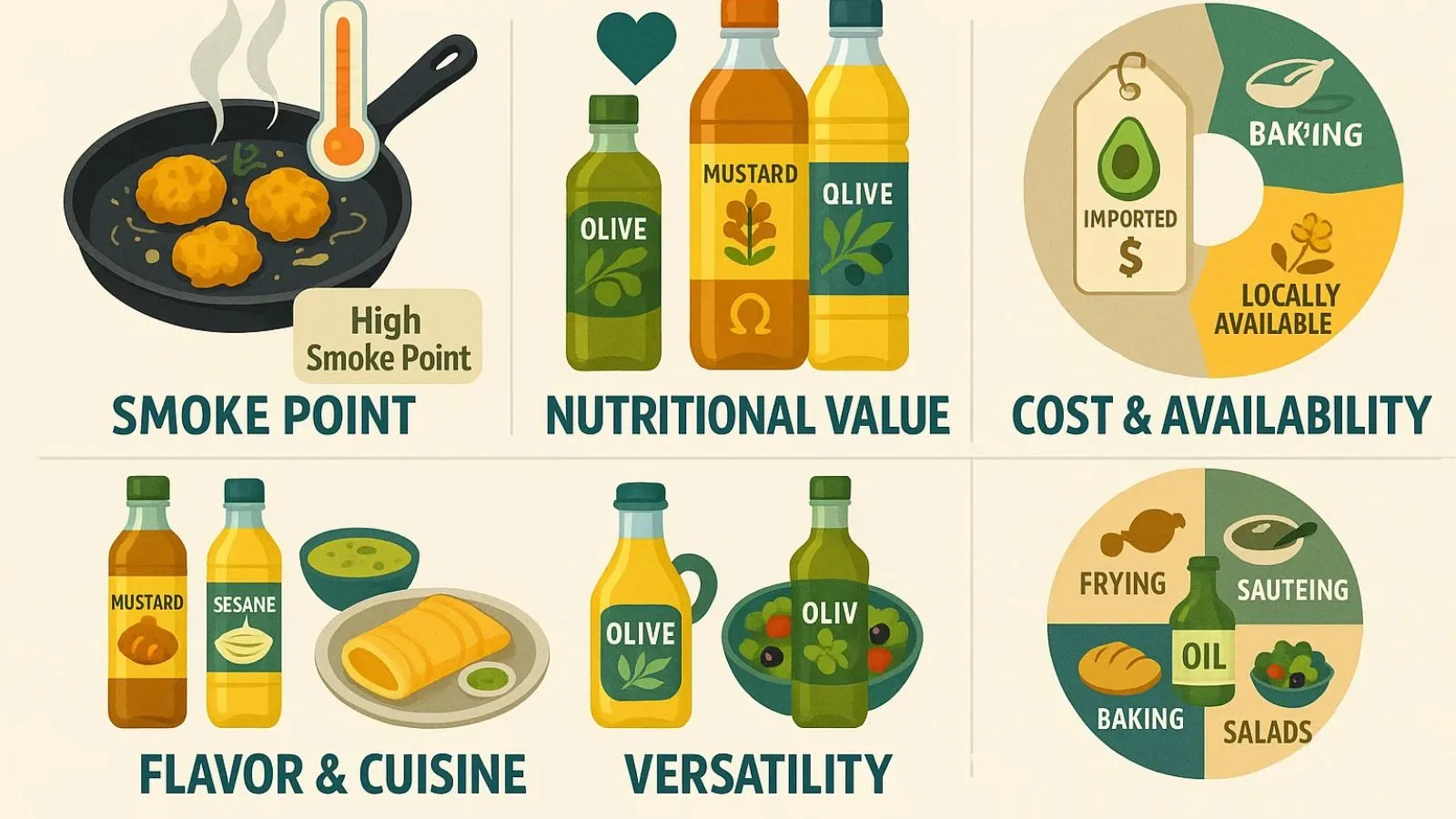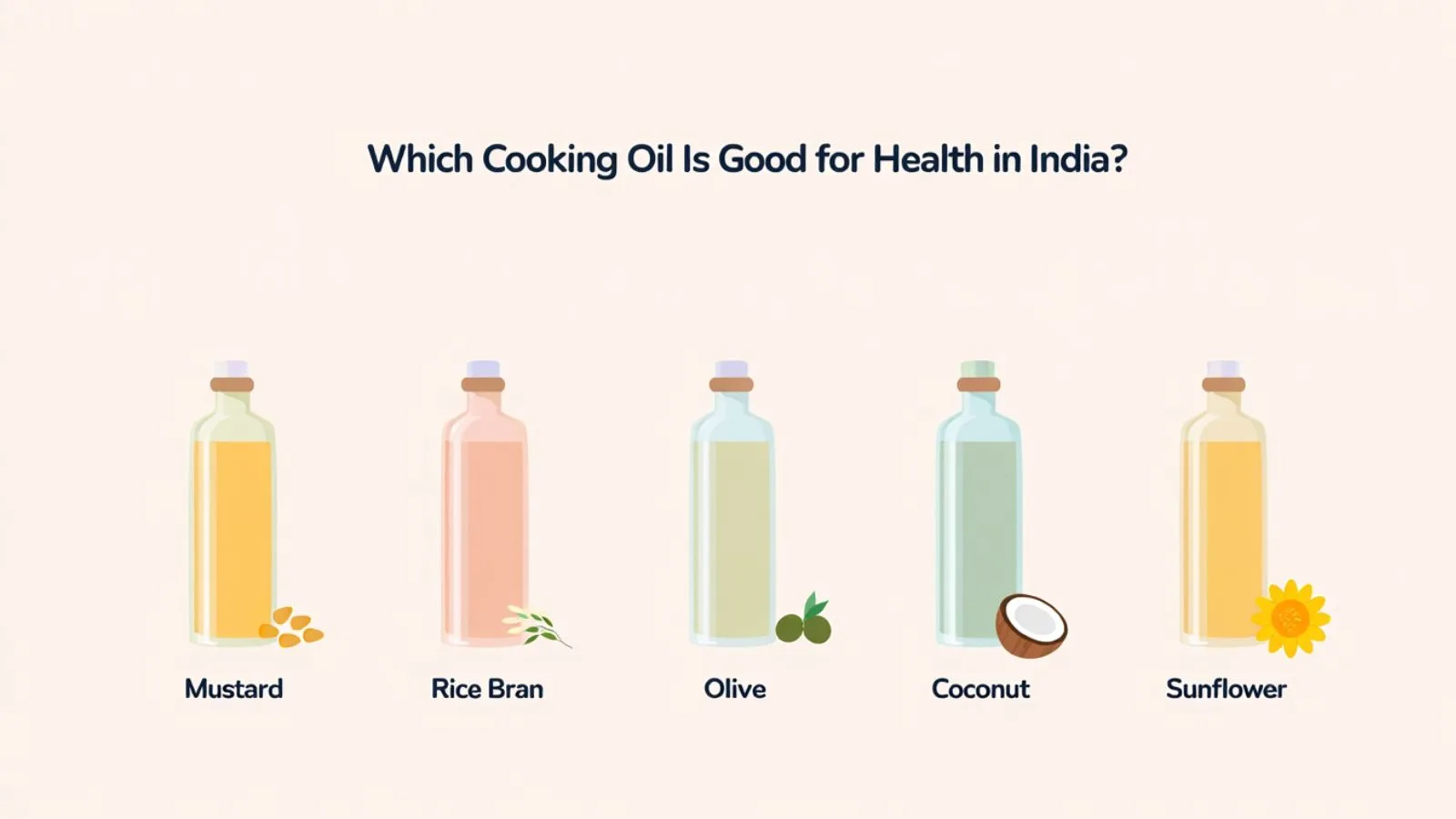Cooking oil is one of the most essential ingredients in every Indian kitchen. From frying crispy pakoras to preparing a simple tadka for dal, it plays a major role in both taste and nutrition. But the choice of oil is not just about flavor—it can significantly impact health.
With so many varieties available, people often wonder which cooking oil is good for health in India. The right choice depends on factors like cooking style, smoke point, and nutritional value. Since different oils contain different types of fats, making an informed decision can go a long way in supporting heart health, weight management, and overall well-being.
In this guide, we’ll explore the types of cooking oils, their health benefits, and expert tips to help you decide which oil is best for cooking in India. By the end, you’ll have a practical approach to choosing the right oil for your kitchen.
You can Also Listen to Our Podcast here,
What is Cooking Oil?
Cooking oil is a type of fat extracted from plants, seeds, or animals, widely used for frying, sautéing, baking, and even salad dressings. It not only adds flavour but also acts as a medium to transfer heat during cooking.
At its core, cooking oil contains different kinds of fats: saturated, monounsaturated, and polyunsaturated, each influencing health in different ways. Oils rich in monounsaturated and polyunsaturated fats, such as olive oil and sunflower oil, are generally considered better for heart health.
There are also various types of cooking oils available in India, ranging from traditional mustard and ghee to newer options like avocado and rice bran oil. Each oil has its own smoke point (the temperature at which it starts burning), nutrient profile, and flavour, which makes it suitable for different cooking methods.
For anyone asking which oil is good for cooking, the answer lies in balancing taste preferences with nutritional benefits. Using the right oil can make meals both delicious and healthier.
Factors to Consider When Choosing Cooking Oil
Selecting the right cooking oil is not just about taste it directly affects your health and how your meals turn out. Here are some key factors to keep in mind:
1. Smoke Point
The smoke point is the temperature at which oil starts breaking down and producing harmful compounds. For deep frying, choose oils with a high smoke point like rice bran or sunflower oil. For light sautéing or salad dressings, olive oil works well.
2. Nutritional Value
Oils differ in their fat composition. Oils rich in monounsaturated and polyunsaturated fats are often considered healthier. For example, olive oil, canola oil, and mustard oil are good for heart health. People often ask which cooking oil is good for health, and the answer lies in selecting oils with balanced nutrients.
3. Flavor and Cuisine
Different oils add different flavors. Mustard oil brings a strong, pungent taste perfect for Indian curries, while sesame oil adds nuttiness to South Indian dishes.
4. Cost and Availability
While imported oils like avocado oil are nutritious, they can be expensive. Locally available oils like mustard or groundnut oil can be more budget-friendly without compromising on health.
5. Versatility
The best choice is often one that suits multiple cooking methods. For those wondering which oil is best for cooking in India, many nutritionists recommend rotating between two or more oils to balance nutrition and taste.
Types of Cooking Oils Popular in India
India has a wide variety of oils used in daily cooking, each with unique health benefits and culinary uses. Understanding the types of cooking oils can help you make smarter choices for your family’s meals, including managing high cholesterol levels.
-
Mustard Oil (Sarson ka Tel)
One of the most traditional oils in Indian households, mustard oil has a pungent flavour and is rich in omega-3 fatty acids. It is widely used in pickles, curries, and frying, especially in North and East India. Regular use in moderation may help maintain healthy cholesterol levels. -
Groundnut Oil (Peanut Oil)
Groundnut oil is light, aromatic, and suitable for deep frying. It contains healthy fats and is a favourite in many Indian states for its affordability and versatility. Its unsaturated fats may contribute to lowering bad cholesterol (LDL). -
Sunflower Oil
With a high smoke point and neutral taste, sunflower oil is a popular choice for frying and baking. Many families pick it when considering which oil is good for cooking daily. Sunflower oil is low in saturated fat, which can support heart health and maintain cholesterol balance. -
Rice Bran Oil
Extracted from the outer layer of rice grains, this oil is rich in antioxidants and vitamin E. It is gaining popularity among health-conscious households for its heart-friendly benefits and ability to help regulate cholesterol levels. -
Olive Oil
Though not native to India, olive oil is commonly used for salads, pasta, and light sautéing. People often include it when exploring which cooking oil is good for health. Its high monounsaturated fat content is linked to improved cholesterol and heart health. -
Coconut Oil (Nariyal ka Tel)
Widely used in South India, coconut oil adds a distinct flavor to curries and seafood. It is also linked to improved digestion and immunity. However, it is high in saturated fat, so moderation is key for maintaining healthy cholesterol. -
Soybean Oil
Soybean oil is affordable, has a neutral flavor, and works well for frying and baking. It’s one of the most widely used edible vegetable oil types in India and contains polyunsaturated fats that may help manage cholesterol levels.
Which Cooking Oil Is Good for Health in India?
When it comes to choosing the right oil, the answer depends on your lifestyle, cooking habits, and dietary needs. People often ask, “Which cooking oil is good for health?”—and the truth is, no single oil works best for everyone. Instead, balance and variety matter.
- Mustard Oil is rich in omega-3 and monounsaturated fats, making it excellent for heart health.
- Rice Bran Oil is packed with antioxidants and vitamin E, which help reduce cholesterol and improve metabolism.
- Olive Oil is a global favorite for salads and light cooking, known for its anti-inflammatory properties.
- Coconut Oil, while high in saturated fat, can be beneficial in moderation and supports digestive health.
- Sunflower Oil is rich in vitamin E and a good choice for frying, but should be alternated with other oils for balance.
Health experts often recommend rotating oils instead of sticking to just one. For example, you might use mustard oil for curries, olive oil for salads, and rice bran oil for frying. This variety ensures you benefit from different nutrients while keeping your meals flavorful.
So, when deciding which oil is best for cooking in India, it’s wise to look beyond just taste and price. Think about long-term health benefits, smoke points, and your cooking style.
Healthy Cooking Tips with the Right Oil
Choosing the right cooking oil is just the first step. How you use it in daily meals also plays a big role in maintaining good health. Here are some simple but effective tips:
Use the Right Oil for the Right Dish
Each oil has a different smoke point. Oils like sunflower, rice bran, and groundnut are best for frying, while olive oil works better for light sautéing or salads. Picking the correct option ensures your food retains nutrients without producing harmful compounds.
Don’t Overheat the Oil
Overheating can break down fats and release toxins. Always cook at moderate temperatures to preserve both flavor and health.
Avoid Reusing Oil Multiple Times
Many Indian households reuse fried oil, but this can increase harmful free radicals. It’s better to use fresh oil instead of recycling the same batch repeatedly.
Practice Portion Control
Even the healthiest oils can lead to weight gain if used in excess. A measured spoon is always better than pouring directly from the bottle.
Rotate Oils for Balanced Nutrition
Since each oil offers unique nutrients, alternating between mustard, sunflower, olive, and rice bran ensures your meals stay both tasty and healthy. This also makes it easier to decide which oil is good for cooking every day.
By combining the right choice of oils with mindful usage, you can enjoy delicious meals without compromising on health.
Also Read,
How Calorie Tracker Buddy Can Help You Make Smarter Oil Choices
Picking the right cooking oil is not just about taste—it directly affects your daily calorie intake and overall health. This is where a smart tool like Calorie Tracker Buddy makes life easier.
With Calorie Tracker Buddy, you can:
- Track Your Oil Intake – It helps you log the type and amount of oil used in cooking, so you never go overboard.
- Compare Different Oils – You can see nutritional values like calories, fats, and vitamins for options such as mustard, sunflower, or olive oil.
- Set Health Goals – Whether you want to manage weight, reduce cholesterol, or improve heart health, this app keeps you on track.
By using Calorie Tracker Buddy, you won’t have to keep guessing which cooking oil is good for health. Instead, you can make data-backed choices that suit your lifestyle and dietary needs.
Conclusion
Choosing the right cooking oil is a balance between taste, nutrition, and health needs. From mustard and sunflower to olive and rice bran, each option has unique benefits. Instead of sticking to just one, rotating different oils ensures your meals are not only flavorful but also packed with nutrients.
When deciding which oil is best for cooking in India, think beyond price and tradition. Focus on heart health, calorie balance, and your cooking style. And with smart tools like Calorie Tracker Buddy, you can easily track your oil usage, compare nutritional values, and make healthier choices every day.
The right oil, used in the right way, can truly transform your kitchen into a healthier space.
FAQs
- Which cooking oil is good for health in India?
Mustard oil, rice bran oil, olive oil, and sunflower oil are some of the healthier choices. Rotating between them offers balanced nutrition. - Which oil is best for cooking daily?
For everyday use, oils like groundnut, rice bran, or sunflower are great. Olive oil can be used for salads or light cooking. - Can I use the same cooking oil for frying and salads?
Not always. Oils with a high smoke point, like sunflower or groundnut, are good for frying, while olive oil is better for raw use in salads. - What is the healthiest type of edible vegetable oil?
Rice bran oil and mustard oil are often considered the healthiest among edible vegetable oils because of their heart-friendly nutrients. - How much oil should I consume daily?
On average, adults should limit intake to 3–4 teaspoons a day, depending on calorie needs and lifestyle. Tools like Calorie Tracker Buddy can help you measure this easily.